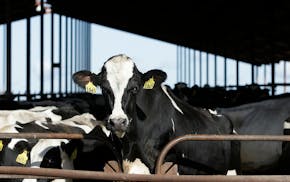Consumers are bringing home the bacon, but it's Hormel's bank account -- and stock price -- that's sizzling.
The Austin, Minn., food manufacturer said Monday that stronger than expected sales of Spam, Dinty Moore soups and pork products such as its Black Label bacon will push 2009 earnings higher than forecast.
Hormel, which had revenue of $6.8 billion last year, singled out strong sales in its refrigerated foods, Jennie-O Turkey Store and grocery products segments. The company raised its 2009 guidance from a range of $2.15 to $2.25 per share to $2.36 to $2.42 per share.
The new guidance beats analysts' average 2009 earnings estimate of $2.29 per share, as reported by Thomson Financial Network.
The news was another sign that food manufacturers have found some traction amid the recession, even as supermarkets struggle. Consumers are eating out less and eating at home more, and they're trading down to cheaper alternatives, leaving Hormel and its line of inexpensive Dinty Moore soups, Spam and Compleats pulling in more money even as retail supermarket spending drops.
Grocery store operator Supervalu, for example, last month reported a decline in retail sales for its first quarter of 2010, citing the recession. CEO Craig Herkert predicted that sales for the Eden Prairie-based operator wouldn't strengthen anytime soon.
Hormel, burdened with high ingredients costs, hasn't been able to fully take advantage of the broader trends. Until now, it seems. As recently as February, it complained of higher-than-expected hog prices. But now it credits its beefy sales numbers, in part, to the plunging price of pork, which has fallen 26 percent from a year ago. The lower prices make it less costly for the company to buy one of its primary ingredients.
Meanwhile, budget-conscious consumers who have been snapping up Hormel's inexpensive meals during the recession continue to push the company's top line.
Monday's announcement is quite a turnaround from October, when Hormel revised its 2008 earnings forecast downward, setting off a selling binge that saw stock shares decline 11 percent in one day. The company said at the time that higher than expected costs and weak performance in its investments were to blame.
Hormel has worked since then to boost sales, even studying the way its products are arranged on supermarket shelves. A program that has been rolled out at supermarkets around the country this year has seen Hormel rearrange some of its foods by method of preparation rather than by food type, so that microwaveable meals and soups appear together rather than in separate areas, for example.
"It's all about optimizing center-store shopping," said Don Stuart, president of marketing and sales at consulting firm Cannondale Associates in Wilton, Conn., which worked with Hormel last year concerning consumer research.
Not only have sales been better than expected, but the company's "rabbi trust" investment -- a tool commonly used by businesses to pay their senior executives and supposedly named because early versions of it were for a rabbi -- performed better than expected as well, contributing to the surprising good news, company CEO and chairman Jeffrey Ettinger said in a statement.
Company officials were unavailable for comment Monday, as Hormel is officially in its quiet period pending the Aug. 20 release of third-quarter earnings.
Besides lower pork prices, analyst Christina McGlone of Deutsche Bank also pointed to turkey prices, which have been helped by cuts in production. Egg sets -- an industry measure of turkey production -- are down 9.7 percent so far this year, and though breast meat prices were $1.38 per pound in July, against $1.73 a year ago, they're higher than April's low of $1.25.
In a note to investors Monday, McGlone raised 2009 guidance on Hormel from $2.33 to $2.40 a share.
Hormel's common stock was included in the Standard & Poor's 500 Index in March, which gave the company a higher profile on Wall Street. It also means that the stock is included in funds that buy based on companies that are part of the index.
The stock hit a 52-week high of $39.04 Monday in midday trading on the New York Stock Exchange. It closed at $38.21, up 5.79 percent.
Matt McKinney • 612-673-7329
